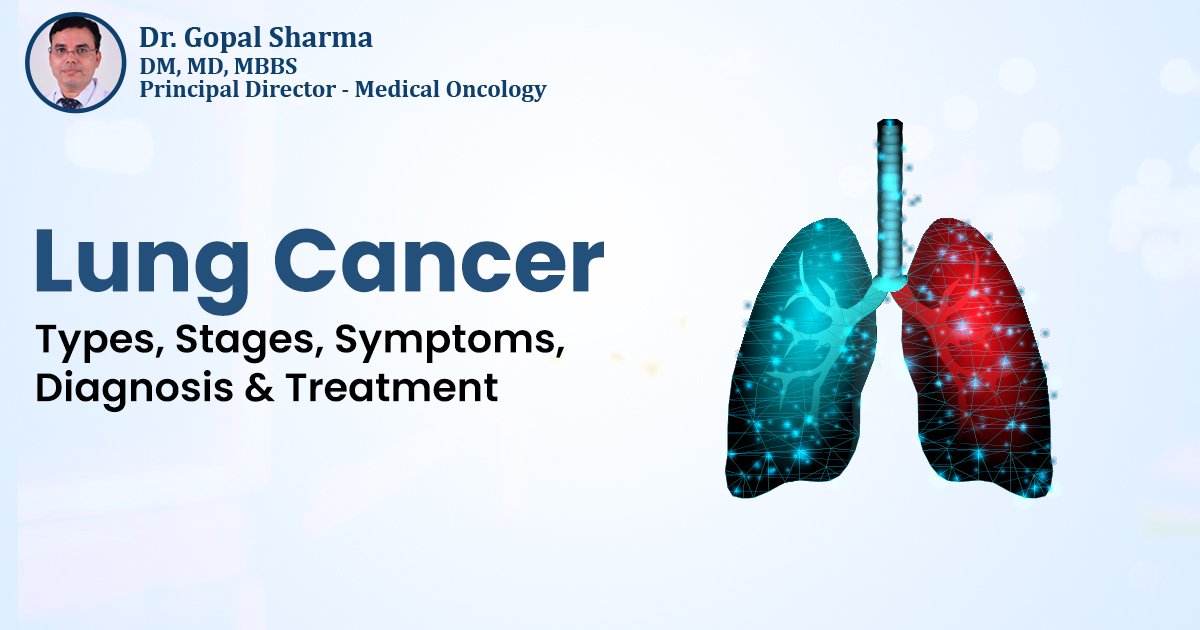Lung cancer is one of the most prevalent and serious forms of cancer worldwide. It affects millions of people every year, posing significant challenges in terms of diagnosis, treatment, and management. Understanding the different aspects of lung cancer can help in early detection and effective treatment. In this blog, we will explore the types, stages, symptoms, diagnosis, and treatment of lung cancer.
Types of Lung Cancer
Lung cancer primarily falls into two main categories.
Non-Small Cell Lung Cancer (NSCLC)
➦ Description: This is the most common type, accounting for about 85% of all lung cancer cases. Large cell carcinoma, squamous cell carcinoma, and adenocarcinoma are some of its subtypes.
➦ Characteristics: NSCLC tends to grow and spread more slowly than small-cell lung cancer.
Small Cell Lung Cancer (SCLC)
➦ Description: This type accounts for about 15% of lung cancer cases and is more aggressive, spreading quickly to other parts of the body.
➦ Characteristics: SCLC is often associated with heavy smoking and tends to respond better to chemotherapy and radiation therapy compared to NSCLC.
Stages of Lung Cancer
Lung cancer staging is crucial for determining the extent of cancer spread and planning the appropriate treatment. The stages are as follows:
➦ Stage 0: Cancer is localized within the lung and has not spread. It is often referred to as carcinoma in situ.
➦ Stage I: Cancer is limited to the lung and has not spread to lymph nodes.
➦ Stage II: Cancer has spread to nearby lymph nodes or the chest wall.
➦ Stage III: Cancer is present in the lung and the lymph nodes in the middle of the chest. This stage is divided into IIIA (cancer spread on the same side of the chest) and IIIB (cancer spread to the opposite side).
➦ Stage IV: Cancer has spread to both lungs, the fluid around the lungs, or to other parts of the body.
➦ Also, visit: Urologic Cancer Treatment
Symptoms of Lung Cancer
Lung cancer symptoms can vary depending on the stage and type of cancer. Common symptoms include:
➦ Persistent Cough: A cough that persists or gets worse over time.
➦ Chest Pain: Pain that worsens with deep breathing, coughing, or laughing.
➦ Shortness of Breath: Breathing problems or feeling out of breath.
➦ Wheezing: A whistling sound when breathing.
➦ Coughing Up Blood: Even a small amount of blood in the cough can be alarming.
➦ Hoarseness: Vocal changes that result in a raspy sound.
➦ Unexplained Weight Loss: Losing weight without trying.
➦ Bone Pain: Ache in the joints or bones.
➦ Headache: Persistent headaches or other neurological symptoms.
Diagnosis of Lung Cancer
Early diagnosis is key to improving lung cancer outcomes. The diagnostic process typically involves:
➦ Imaging Tests: Chest X-rays, CT scans, PET scans, and MRIs help visualize the tumour and assess its spread.
➦ Sputum Cytology: Examining mucus from the lungs under a microscope to detect cancer cells.
➦ Biopsy: Removing a small sample of tissue from the lung to examine for cancer cells. This can be done via bronchoscopy, needle biopsy, or surgical biopsy.
➦ Blood Tests: These can help assess overall health and organ function but are not specific for lung cancer.
➦ Molecular Testing: Identifying specific genes, proteins, and other factors in the tumor to tailor treatment options.
Click Here to know about Liver cancer
Treatment of Lung Cancer
Treatment options for lung cancer depend on the type and stage of cancer, as well as the patient’s overall health. Common treatments include:
➦ Surgery: Removing the tumor and nearby tissue. Types of surgery include lobectomy, pneumonectomy, and segmentectomy.
➦ Radiation Therapy: Use high-energy radiation to destroy cancerous cells. It is often used in conjunction with surgery or chemotherapy.
➦ Chemotherapy: Using drugs to kill cancer cells. It can be given before surgery to shrink tumors or after to kill remaining cancer cells.
➦ Targeted Therapy: Using drugs to target specific genetic mutations in cancer cells.
➦ Immunotherapy: Boosting the body’s immune system to fight cancer cells.
➦ Palliative Care: Providing relief from symptoms and improving the quality of life for patients with advanced cancer.
Dr. Gopal Sharma | The Cancer Specialist at Max Hospital
Dr. Gopal Sharma is renowned for providing exceptional cancer treatment. With years of experience and a deep understanding of lung cancer, Dr. Sharma provides personalized treatment programmes that are suited to the requirements of each patient. His expertise in advanced diagnostic techniques and cutting-edge treatments ensures that patients receive the best possible care.
At Max Hospital, Dr. Sharma and his team are committed to delivering comprehensive cancer care, including surgery, chemotherapy, radiation therapy, and supportive care. They work closely with patients and their families to provide compassionate support throughout the treatment journey.
➣ If you Are Interested then Book an Appointment with the Best cancer specialist in Delhi NCR
In the Summary
Lung cancer is a serious and complex disease, but understanding its types, stages, symptoms, diagnosis, and treatment options can empower patients and their families to make informed decisions. With expert care from specialists like Dr. Gopal Sharma at Max Hospital, patients can access the latest treatments and compassionate care to improve their outcomes and quality of life. If you or a loved one is facing lung cancer, don’t hesitate to seek expert care and support.







